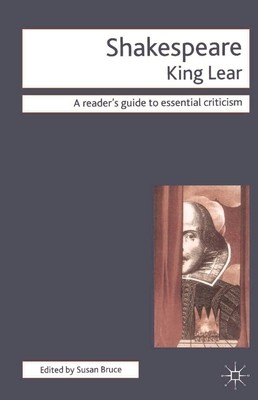
- We will send in 10–14 business days.
- Author: Susan Bruce
- Publisher: Red Globe Press
- ISBN-10: 1874166714
- ISBN-13: 9781874166719
- Format: 14 x 21.6 x 1.1 cm, minkšti viršeliai
- Language: English
- SAVE -10% with code: EXTRA
Reviews
Description
Of the huge body of critical writing devoted to Shakespeare's plays, by far the greatest proportion is concerned with the tragedies - and, for students of English literature, a familiarity with the great tragedies remains a necessity. To deal with such a massive volume of critical writing, however is no simple task. Critical commentary on King Lear ranges across nearly 3 centuries and reflects the changing tastes, perceptions and literary conventions of many ages.
In this Readers' Guide, Susan Bruce provides the readers with a pathway through the major writings on King Lear, tracing the development of the numerous critical debates and shifts in perspective that have led to the successive revaluations of this central work. The Guide provides extracts and essays from contemporary critics who write as academics and literary scholars, as well as from those who wrote as 'educated amateurs' in the 18th and 19th centuries, and at each stage the secondary material is set in context and arranged to provide students with a firm grasp of the progress of critical thinking on the play.EXTRA 10 % discount with code: EXTRA
The promotion ends in 23d.16:51:45
The discount code is valid when purchasing from 10 €. Discounts do not stack.
- Author: Susan Bruce
- Publisher: Red Globe Press
- ISBN-10: 1874166714
- ISBN-13: 9781874166719
- Format: 14 x 21.6 x 1.1 cm, minkšti viršeliai
- Language: English English
Of the huge body of critical writing devoted to Shakespeare's plays, by far the greatest proportion is concerned with the tragedies - and, for students of English literature, a familiarity with the great tragedies remains a necessity. To deal with such a massive volume of critical writing, however is no simple task. Critical commentary on King Lear ranges across nearly 3 centuries and reflects the changing tastes, perceptions and literary conventions of many ages.
In this Readers' Guide, Susan Bruce provides the readers with a pathway through the major writings on King Lear, tracing the development of the numerous critical debates and shifts in perspective that have led to the successive revaluations of this central work. The Guide provides extracts and essays from contemporary critics who write as academics and literary scholars, as well as from those who wrote as 'educated amateurs' in the 18th and 19th centuries, and at each stage the secondary material is set in context and arranged to provide students with a firm grasp of the progress of critical thinking on the play.

Reviews